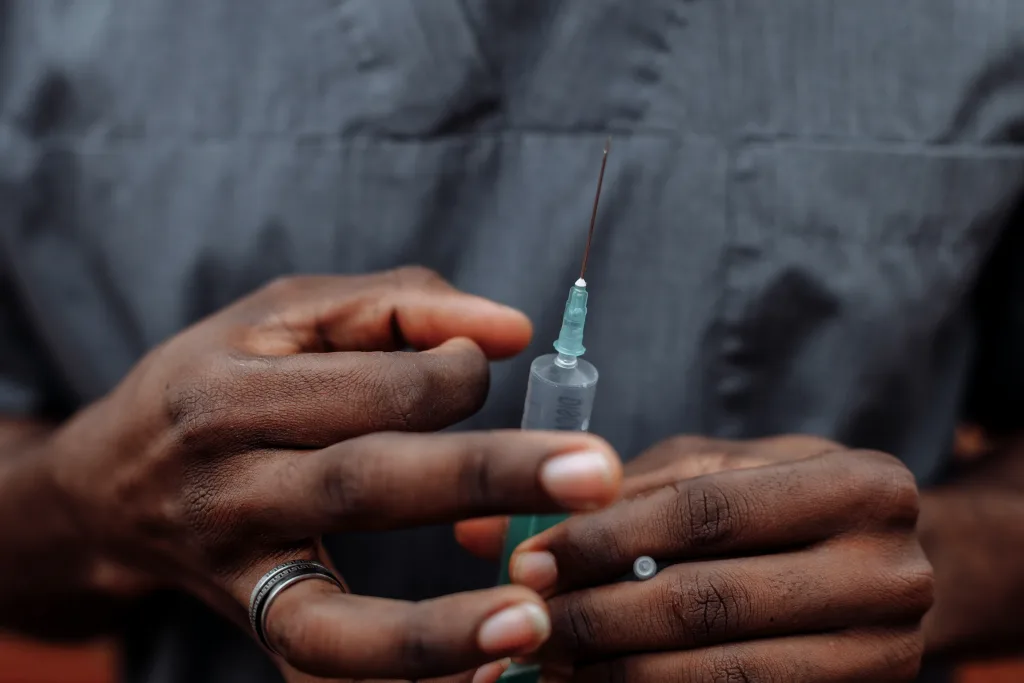Introduction
As rates of obesity and weight-related health issues continue to climb globally, the desperation many feel to lose excess weight is understandable. In response, countless diets, supplements and medical treatments promising rapid and effortless fat loss have flooded the marketplace. Among the options that have persisted in popularity for decades are human chorionic gonadotropin (HCG) injections.
While intriguing weight loss claims about HCG abound across websites and forums, the potential risks are far less discussed. This leaves consumers vulnerable to harm from undertaking medically-unproven treatments without fully informed consent. Here, we aim to unpack exactly what HCG is, review the science (or lack thereof) behind its use for weight loss, and highlight key side effects those considering HCG should know prior to injection.

Understanding Human Chorionic Gonadotropin (HCG)
HCG is a natural hormone produced during pregnancy which helps signal the woman’s body to access stored fat to nourish the growing fetus. Somewhere along the way, entrepreneurs made the leap that since HCG seemed to tap fat stores during pregnancy, injecting it could do the same for non-pregnant individuals wanting to lose weight.
Most HCG diet protocols call for daily injections or oral drops of HCG combined with an extremely low calorie diet, typically under 800 calories per day for weeks at a time. The claim is that HCG will prompt aggressive fat burning without loss of muscle mass, allowing dieters to lose substantial weight rapidly. However, despite decades of use and anecdotal claims, quality evidence establishing HCG as safe or effective for weight loss remains lacking.
Brief History of HCG for Weight Loss
The first medical documentation experimenting with HCG injections for weight loss was published in 1954 based on a protocol created by British endocrinologist Dr. Albert T.W. Simeons. After running trials at his Italian weight loss clinic injecting patients with HCG, he proposed that it shifted the body to utilize stored fat for energy while protecting structural fat and muscle mass.
Dr. Simeons’ “Pounds and Inches” HCG diet protocol spread rapidly and clinics specializing in the method opened globally. Over the decades, HCG injections, oral drops, pellets and sprays have persisted as popular weight loss aids often marketed as a solution for rapid, substantial fat and weight loss without starvation or loss of muscle mass.
Despite the early claims and proliferation of HCG for dieting over 70+ years now, rigorously designed large scale studies demonstrating both its safety and efficacy are still lacking. Very few independent, controlled clinical trials meeting evidence-based medicine standards have materialized. Those small trials that have ensued revealed minimal to no benefit of HCG for enhancing weight loss beyond standard caloric restriction.
In 1976, after a review of the research, the FDA determined there was no scientific evidence substantiating HCG for weight loss purposes and mandated labeling indicating as much. Nevertheless, the popularity of and demand for HCG diet programs has continued on into the modern day. Still today in 2023, medspas, weight loss clinics and online wellness companies aggressively market HCG diet injections, pellets or oral drops as rapid and substantial fat loss aids, often citing Dr. Simeons 1950s era claims as proof.

Potential Side Effects of HCG Injections
Like any hormone injected or ingested with aims of chemically altering the complex natural equilibrium within the body, HCG shots potentially have numerous unintended effects. While the concept clearly sounds highly appealing to frustrated dieters desperate for weight loss, some more concerning adverse outcomes typically remain undiscussed though warrant equal air time for truly informed decision making.
Hormonal Imbalances
Since HCG is a direct hormone preparation which acts on the body’s intricate internal communication pathways, intake immediately throws off that delicate chemical balance. Hormone specialists note both men’s and women’s natural testosterone, estrogen, progesterone and other critical regulatory hormones often become disrupted.
Women undergoing HCG shots specifically face risks of menstrual cycle cessation or unpredictable ovulation suppression for months from the artificially induced hormonal fluctuations. Researchers still lack data regarding longer term reproductive repercussions of HCG cycling as well.
Ovarian Hyperstimulation Syndrome (OHSS)
In some rarer but concerning cases, HCG overstimulates the ovaries, resulting in Ovarian Hyperstimulation Syndrome (OHSS). Beyond abdominal pain from inflamed ovaries, nausea, diarrhea and rapid weight gain from fluid retention characterize OHSS. At worst, OHSS can progress to blood clots, kidney damage, electrolyte imbalances or even the more severe life-threatening thromboembolism if not promptly addressed.
Since HCG directly acts on ovaries as part of its biological role in pregnancy, the risk of OHSS merits strong consideration—especially for women with polycystic ovarian syndrome (PCOS) or other ovarian disorders. Those over 35 facing pre-existing fertility challenges may also wish to exercise extra caution with HCG.
Blood Clotting Concerns
Researchers have observed HCG shots seem to increase certain blood clotting factors in both veins and lungs while also making blood platelets stickier and more prone to clumping together. As a result, some predisposed individuals may face heightened risks of developing blood clots (known medically as thromboembolism) when undergoing HCG use.
This poses greatest danger when clots travel to the lungs (pulmonary emboli), heart (myocardial infarction) or brain (embolic stroke). Given the cardiovascular and potential neurologic risks, those with histories of clotting, heart disease, stroke, high blood pressure or taking birth control pills warrant particular caution with HCG injections for weight loss.
Mood Changes & Psychological Distress
The significant hormone fluctuations coupled with an extremely low calorie, nutritionally deficient diet often negatively impinge upon mental health and mood while undergoing the HCG protocol. Anxiety, depression, mood swings, trouble concentrating, diminished sleep quality, food obsession and even suicidal ideation characterize some of the psychological complaints dieting individuals self-report.
One study comparing over 4,000 patients following either a standard low calorie diet without HCG or the HCG protocol found 35% of those injecting HCG experienced mild to severe depression symptoms—more than double the rate as the control group. For those predisposed to or already struggling with mental health disorders, psychological risks call for careful weighing.

Individual Differences in Sensitivity & Response
Critically, responses to and risks associated with HCG injections demonstrate tremendous individual variability across patients due to differences in genetics, metabolic function, lifestyle habits, demographic factors, underlying health conditions and medications taken. As a result, some dieters may experience little ill effect while others face life-threatening complications—all from the exact same HCG dose.
Rash Internet testimonials claiming HCG universally provides dazzling weight loss with no adverse effects fail to capture this heterogeneity in human biological response. Responsible physicians always highlight that, for reasons not fully elucidated, a procedure may carry grave danger for some patients while showing negligible risk for others. There are still no definitive large scale trials establishing clear effectiveness and safety data for HCG—only scattered anecdotes.
Those over 60, anyone with current or a family history of cancer, blood clots, heart disease, diabetes, thyroid disorders or stroke and women diagnosable with polycystic ovarian syndrome (PCOS) warrant particular caution—or potentially avoidance of—HCG. Adverse outcomes become more likely for those facing underlying cardiovascular, hormonal, kidney or additional health vulnerabilities. Of course, always thoroughly consult your physician before considering HCG.
Healthy & Sustainable Weight Loss Alternatives
Far and away, substantive peer-reviewed medical evidence along with legacy human existence indicates that sustainable healthy weight loss and maintenance ensues from consistent lifestyle improvements in nutrition and physical activity rather than any quick fix potion, pill or injection. There exist no shortcuts—despite what profit hungry direct-to-consumer companies propagating such myths may claim.
To effectively shed excess body fat safely and consistently, experts encourage focusing on integrated healthy habits like:
- Developing a thoughtful nutrition plan filled with satiating yet nutrient-dense whole foods within your caloric range. Design meal plans promoting consistent regulated energy levels rather than spikes and crashes.
- Increasing cardiovascular exercises within your limits and enjoying movement whenever possible. Walk, bike or swim for 30-60 minutes daily rather than demanding excessive high intensity training which risks burnout.
- Adding muscle building resistance training incorporating weights, bands, machines or even bodyweight moves. Muscle inherently burns more calories than fat, naturally elevating metabolism. But ease into resistance training and avoid overdoing it.
- Setting realistic goals around 1-2 pounds of loss per week. Dramatic rapid loss often leads to frustration, burnout and weight regain. Make small adjustments thoughtfully and practice patience, self-compassion and persistence.
For those facing medical barriers like hormonal conditions, injuries, disabilities or time constraints that hinder engagement in standard diet and exercise regimens, alternative evidence-backed options like Saxenda, Qsymia, cognitive behavioral therapy for mindful eating or supervised fasting exist as well. Discuss the pros, cons and contraindications of such alternatives with your doctor.

Conclusion & Key Considerations
In summary, while highly alluring promises of effortless weight loss treatments will always permeate consumer consciousness, we must all think critically before injecting pregnancy hormones or undertaking dangerously low calorie diets in pursuit of a socially constructed body ideal. Responsibly weigh both the purported benefits and very real risks when evaluating any weight loss intervention.
If still considering HCG after learning of the common and rarer side effects, have an in-depth discussion with your physician about your unique health profile and risk factors. Those facing underlying cardiovascular, hormonal, mental health or additional challenges warrant particular caution. While anecdotal weight loss testimonials abound on the internet, listen to your doctor’s objective evidence-based guidance.
For additional insights on debunking wellness misinformation and safely improving your relationship with food, exercise and body, subscribe to our newsletter. Every week we deliver 100% free tips and tools directly to your inbox empowering you to reach your health goals. You deserve to make fully informed decisions about your body. We’re here to help you do so.
Thank you for reading this post, don't forget to subscribe to our free newsletter
!
